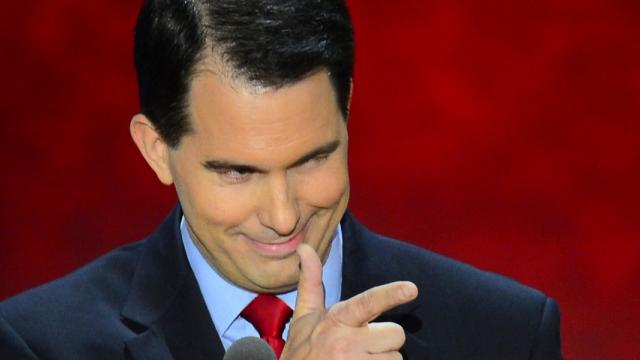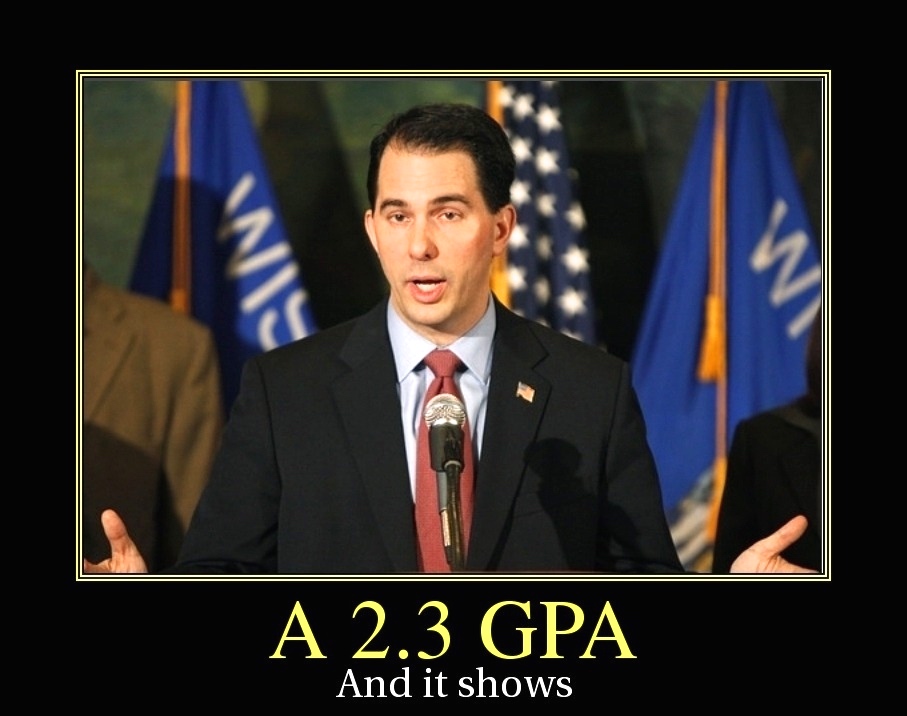
Wisconsin Governor Scott Walker has been the dark horse in the GOP presidential nomination ever since campaigning started in the spring. His official declaration on July 13 is perfectly timed, as all the outwardly batty Republicans have had plenty of time to show America they’re a few cards short of a full deck. This makes Scott Walker appear to be the sane, rational candidate. While the punditocracy will likely declare Walker the “most electable” based on his plain vanilla demeanor and shortage of gaffes, a closer look at Walker’s record as governor makes him the most dangerous and extremist candidate on the GOP stage.
Donald Trump, who at the time of this writing is second place in New Hampshire polls, is still being decimated in headlines after sharing his views of Mexican immigrants as drug dealers and rapists, and refusing to walk back his statements. Sen. Ted Cruz, who was the first Republican to declare a presidential campaign, has made his career off of extremism, most notably leading the government shutdown of 2013. New Jersey Governor Chris Christie is widely seen as an extremist for allegedly using his office to seek retribution against political opponents, even in the wake of major environmental disasters like Hurricane Sandy. As Oklahoma's former U.S. Senator and influential Republican Tom Coburn said, the current crop of GOP presidential candidates is “not ready for prime time.”
Gov. Walker, in the meantime, is leading the GOP pack in fundraising, having already secured donations from half of the nation's top 250 Republican donors during his previous gubernatorial campaigns. He's wowing crowds in Iowa and New Hampshire with his brand of sleeves-rolled-back, aw-shucks populism reminiscent of Scott Brown’s successful pickup truck-led U.S. Senate campaign in 2010 in Massachusetts. Walker's kids go to public schools. He paid $1 for a sweater he bought at Kohl’s. He got his suit at Jos. A. Bank. He takes a brown bag lunch to work.
Voters want a candidate who reminds them of themselves, and on the surface Walker comes off as a no-nonsense politician who just wants to save the taxpayers money, help businesses succeed, and have a beer with you. He’s currently leading in Iowa, according to recent polls. If the media doesn’t do their due diligence, that misleading image will carry Walker to the GOP nomination and, perhaps, to the White House. But just beneath his populist veneer is an overly-ambitious politician who has built his career on dishonesty, vindictiveness, and corruption.
During my time in Wisconsin, I occasionally participated in the daily Solidarity Sing Along – a noontime gathering of several dozen community activists who meet at the state capitol rotunda to sing old labor and civil rights songs, re-written to celebrate the values of the Wisconsin Uprising of 2011 and to protest Walker’s union busting policies. The Sing Along went largely uninterrupted until a Walker-appointed bureaucrat at the Department of Administration imposed “emergency rules” in the summer of 2013 that required any group larger than 20 gathering on public property to obtain a permit or face penalties. Over the next three months, 186 people were arrested, and 349 citations were issued for the crime of singing without a permit. Arrestees included elected officials, firefighters, teachers, teenagers, journalists, and little old ladies. These citations were all subsequently thrown out after a Wisconsin appeals court ruled the permit rule as unconstitutional (FULL DISCLOSURE: I was one of the arrestees). But Walker trampling on the First Amendment rights of his political opponents is just scratching the surface.
Scott Walker is not above changing laws to suit wealthy campaign donors. Chris Cline, billionaire owner of Gogebic Taconite (GTac), donated $10,000 to Walker’s 2010 gubernatorial campaign just before he contacted Walker about building an open-pit iron mine in Northern Wisconsin. GTac executives and mine supporters donated a combined $15 million to Walker and GOP legislators while various mining bills were being negotiated. In 2013, Walker signed a bill into law that would allow GTac to build its mine, dump waste into pristine streams and rivers, avoid publicly verifying that the mine followed all environmental laws, and evade paying taxes meant to help affected communities.
As governor, Scott Walker has made a habit of using his office to reshape state government apparatus into a profit-making instrument for private industry. His appointee to the state Department of Natural Resources (DNR) – the agency tasked with implementing environmental regulations – is Cathy Stepp, a former Wisconsin Republican state senator vehemently opposed to environmental regulations. One of Stepp’s first actions as DNR chief was to stifle the implementation of new federal regulations on phosphorous emissions for two years. Coincidentally, Walker backers David and Charles Koch own several Georgia Pacific paper mills in Wisconsin, which regularly dump thousands of pounds of phosphorous into Wisconsin waterways. The Koch brothers poured $11 million into helping Walker through his recall election, and have committed to backing his candidacy with the $900 million they’ve promised to spend in 2016.
Along with aiding corporate donors with loose regulations and favorable legislation, Gov. Walker has also proven his willingness to simply hand over public money to private corporations with little to no accountability. Walker’s Wisconsin Economic Development Corporation (WEDC), which was created to grant businesses with grants funded by state tax dollars, has become a symbol of corruption in the Badger State. By 2012, the WEDC had lost track of at least $8 million in public money that had been loaned to 99 businesses. In 2013, the WEDC’s first audit showed that the agency had failed to track the number of jobs created with public money used to subsidize businesses – a violation of state law. Fifty-six percent of agency credit card purchases had no description when listed on expense reports, and some of the purchases included alcohol, iTunes gift cards, and tickets to sporting events.
Most recently, just before the Fourth of July weekend, Gov. Walker's Republican allies in the legislature proposed dramatic changes to Wisconsin's open records laws. The revisions would have imposed restrictions on revealing who authored notes and drafts of proposed legislation and amendments, and who contacted legislators regarding public information, among other restrictions on “deliberative materials.” The controversial proposal was concealed inside a last-minute budget “wrap-up” motion with dozens of other items, which is traditionally voted on late at night or before a holiday. Walker’s involvement in drafting these changes wasn’t revealed until late last week after a wave of bipartisan outrage stopped the revisions in their tracks.
The fact that Gov. Walker’s office was involved in drafting revisions to open records laws just before his presidential campaign announcement and resulting media frenzy is significant, as many of his more controversial actions as governor would have never been revealed to the public had those revisions been passed. GTac’s involvement in personally drafting language in the mining deregulation bill was made public after open records requests. Public records also revealed that a charter school lobbyist that represented private schools receiving $380 million in state dollars from school vouchers was deeply-involved in drafting language in Wisconsin’s school voucher program. And Walker’s unsuccessful idea to strike the Wisconsin Idea from the University of Wisconsin mission statement (change “search for truth” and “improve the human condition” to “meet the state’s workforce needs”) was made public thanks to the state’s open records laws. Had Walker succeeded in blocking access to the state’s public records, critical information would have been withheld from national and international media outlets covering the 2016 election.
Most alarmingly, Gov. Walker has signed a state budget into law that simultaneously allows a 7-day workweek for manufacturing and retail workers while striking a 100-year-old law from the books stating that Wisconsin’s minimum wage of $7.25 must be a “living wage.” Coincidentally, that change comes on the heels of a coalition of low-wage workers suing the Walker administration for refusing to acknowledge their complaint that $7.25 an hour is not a living wage. Since “living wage” is rewritten as “minimum wage” in all applicable state laws, the lawsuit will likely be invalidated.
The 7-day workweek bill, originally proposed by Republican state senator Glenn Grothman (now a member of U.S. Congress), technically doesn’t force workers to work 7 days a week, but allows them to “voluntarily” work without a 24-hour period of rest. Employers can easily get around this language by asking potential new employees in the interview process if they’re willing to work 7 days a week, and filtering out those who say "no." Employees hired after saying “yes” to the question could then be fired for asking to take a day off once a week. Gov. Walker's support for a budget that includes this extremist provision puts him in the same ranks as the robber barons of the early 20th century who fought the 40-hour workweek and child labor laws.
Scott Walker and lazier members of the political media may present the Wisconsin governor as a reasonable alternative to the current field of Republican presidential candidates. But voters who look deeper into Walker’s record will see that despite his carefully-sculpted image, the man is more of an extremist than anyone else in the race.
3 WAYS TO SHOW YOUR SUPPORT
- Log in to post comments

















